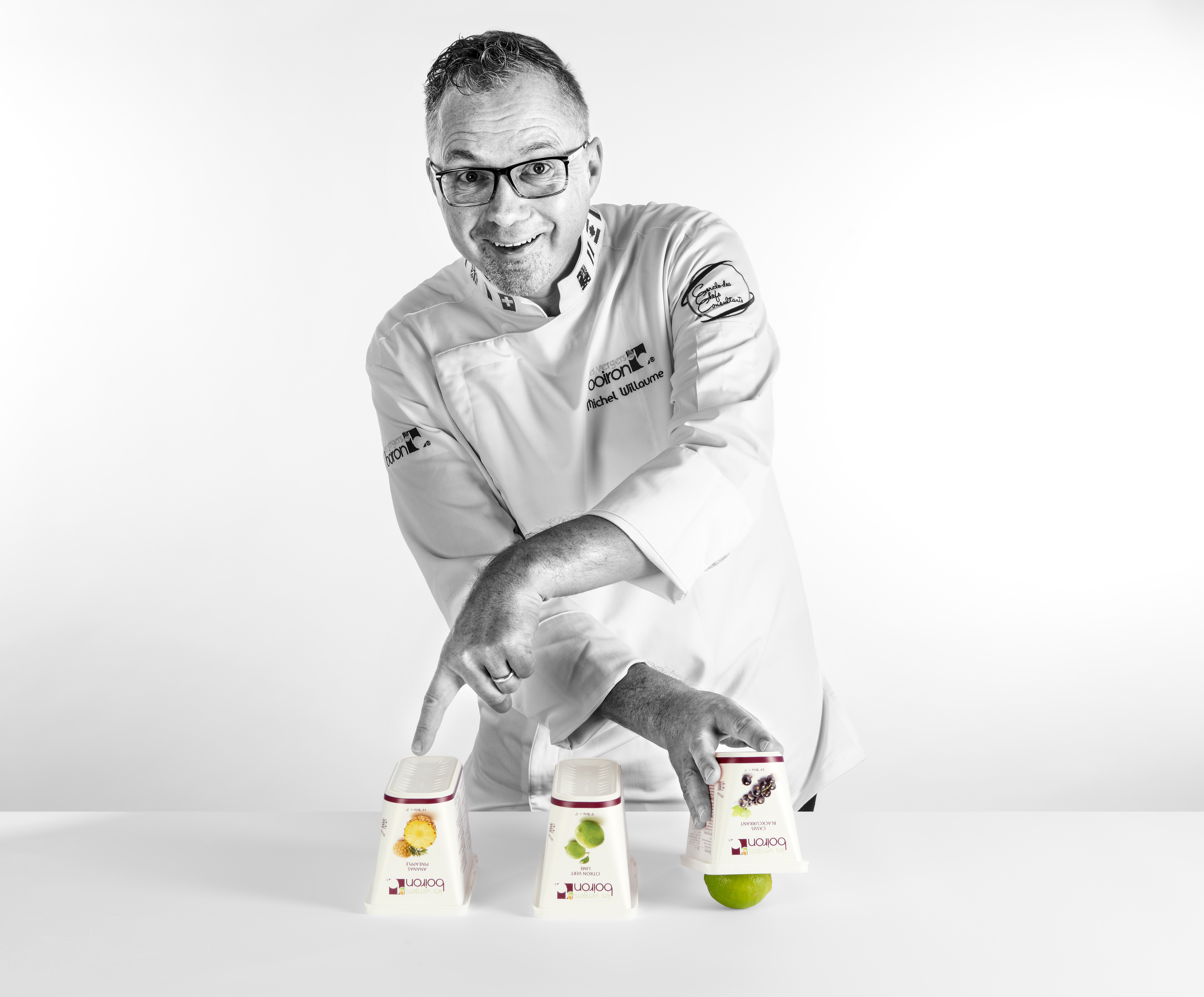Michel Willaume is the head of Think Pastry, a Barcelona-based consulting firm, working with schools, restaurants and shops. He shares with us his vision of his philosophy and his craft.
Tell us a bit about your origins and experiences over the years.
I was born in Nantes (in Western France) 52 years ago. I began as an apprentice when I was 15, at Drala, a local pastry shop and then went on to work for Dalloyau, Matignon and Karly in Paris before returning to my hometown to work with Jamin. I then became executive pastry chef at the Ritz Carlton in Barcelona, before living for eight years in the US. In 2001, I was part of the American team that won the World Pastry Championship in Lyon. I then spent some time in Japan before I settled in Barcelona and founded Think Pastry in 2006. I’ve also been a Les vergers Boiron Brand Ambassador and a Valrhona Ambassador for many years, which has enabled me to work with and train chefs all over the world.
So now, give us an idea of the Think Pastry philosophy.
For me, there is no distinction between thinking and doing. The Germans have a wonderful word for this, Praxis, which literally means putting your thinking into practice. This means experiencing life with all it has to offer, from traveling the world to coming and linking the greatest diversity of cultures by meeting people who are passionate about what they do and exchanging ideas and inspirations with them. Being a pastry chef is not about who I am personally or what I achieve; it’s about sharing and transmitting the very best knowledge with the very best people. The Think Pastry philosophy can be summed up in four phrases: Knowledge is fundamental – Experiencing is everything – Listening closely is the best way to source people’s needs – Knowledge is sharing thinking, which creates a virtuous circle.
It seems to me that this notion of sharing goes one step further, in terms of the links you establish between different forms of creativity.
Absolutely, the key to progressing is to crossover from one discipline to another. For example, pastry making is increasingly being inspired by gastronomy’s constant search for new taste combinations, while visual creativity in pastry making is having a continued effect on gastronomy. In all culinary fields, there has been a huge increase in knowledge, both technical and cultural. We’ve also broken down the barriers between the past and the present. I can use my father’s and grandfather’s sense of feel of a fruit to predict its taste, but I can also explore and adopt new techniques based on recent scientific knowledge. So, the Think Pastry concept isn’t abstract, or purely aesthetic. It’s about researching techniques that make for better and healthier foods and which also allow readily available ingredients to be used in efficient production processes so that as many people as possible have access to good quality food.
So how do you work and who do you work with?
I try to associate different tastes in my mind, such as an herb and a fruit, before carrying out tests. Imagining things in a way where thinking expresses senses and where transforming them into reality expresses the original sensitivity. That’s why teaching is so important for me because motivated people really want to do that: challenge themselves to turn what’s in their mind and make it real. And there’s magic in mixing imagination and discipline with technique and creativity. You have to think simultaneously within the confines of physical knowledge and outside the box of convention.
I work with a wide variety of people and companies, from apprentices who want to learn the fundamentals to established companies that want to innovate and explore possibilities outside their comfort zone. I have my own way of teaching, adapting myself to my specific interlocutors. Technically, I like to explain all recipes, all ingredients, all methods and process in a way that people understand and that will enable them to ultimately think for themselves. I’ll ask them literally to think pastry, because if they learn how to think, they will learn the logic of pastry and, most of the time, they already know the answer. I just need to help them search it out in their minds and bring it out into the world.
And what’s your vision of the future?
I don’t think I can give you a simple answer to that question. When you embark on creative work, you never really know what will come out and when you are a taste ‘globetrotter’ like me, you don’t really want to lock yourself into a preconceived notion of where you’re going. I’m a fanatic about the knowledge and use of products in different contexts and their obvious or hidden taste meanings. So it is clear that my pastry creativity work will necessarily be influenced by these contexts and will always evolve. I strive to respect and bring positive criticism to these different contexts I explore. I try to integrate their quintessence and, if people in other contexts have their way of achieving flavors they think their customers want or their preferences in tastes or decoration, I will try and understand their particular world, but I will also try to give them some ideas to question and renew themselves. Spontaneity and natural thinking are essential for me and I try to communicate my way of combining elements, based in large part on flavors, but also on visual influences. I then leave it to each individual to find his or her own formula for success. And, the great thing, I get back as much, if not more, than I put out.

